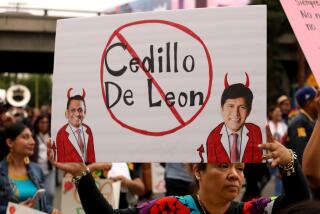Rights Activists Renewing Drive in Cuba
- Share via
WASHINGTON — Human rights activists in Cuba are renewing their drive for legal recognition in spite of persistent government hostility, and they hope that Havana’s newly evident wish for better relations with the United States will help them, recent developments show.
The activists’ determination was underscored in an hourlong tape recording recently smuggled out of that island nation and made available to reporters here.
The recording was made at a December protest meeting, at which members of the Cuban Human Rights Committee said they hope they will be protected from further persecution by President Fidel Castro’s moves for improved relations with Washington and by global public opinion.
The Human Rights Committee’s tape was played for journalists by Frank Calzon, Washington representative of Freedom House, a New York foundation dedicated to the promotion of democracy. Calzon declined to say how he obtained the tape but vouched for its authenticity.
During the meeting, which took place somewhere near Havana, Ricardo Bofills, who has headed the committee since its founding in 1976, reiterated charges that the Castro government has imprisoned or executed people whose only crime was political dissent.
“Death sentences are not justified in Cuba,” said Bofills, himself a victim of long imprisonment who took refuge in the French Embassy last year and is now living underground in Havana.
“You haven’t heard of serious sabotage or assassinations (by opposition elements) taking place here,” Bofills said. “What would happen if there were violent opposition like that in Spain or El Salvador?”
Bofills, a former diplomat and a writer, asserted that there has been no violence against the government, “but we can really talk about the violence of the government against political offenders.”
Few Options for Artists
On the tape, spokesmen for the arts denounced the regime’s repressive policies. Writer Reynaldo Bragado Bretana said: “The options for Cuban artists are exile, prison or singing the praises of the government. Those who take the last course are the saddest because we lose their talent entirely.”
Enrique Hernandez Mendez, who acted as moderator as nearly a dozen persons spoke, described efforts to officially register the committee so that it could work legally.
“The government response is to send you to prison,” said Hernandez, a former journalism student.
Nevertheless, Hernandez said he believes that the government attitude is now softening. He attributed the change to the world attention directed toward Cuba’s human rights situation and to the “collapse of morale” within the government resulting from economic deterioration in Cuba during the last few years.
A U.S. official, speaking on condition that he not be identified, confirms that Castro’s government has intensified efforts to thaw the near-frozen condition of U.S.-Cuban ties.
The official pointed out that recent bilateral talks held in Mexico City to discuss resumption of normal immigration from Cuba to the United States were officially described by the U.S. side as “constructive,” a diplomatic term translated as “things went a lot better than expected.”
Chief among the Reagan Administration’s conditions for better relations--or for easing the quarter-century-long U.S. economic embargo, which is Cuba’s most-wanted objective--are the withdrawal of Cuban troops from Angola and an end to Cuban support for Marxist-led revolutionaries elsewhere in Latin America.
A dramatic demonstration of the Cuban government’s efforts to improve its U.S. contacts came Sunday, when a 200-member delegation of the Washington-based World Business Council flew from Miami to Havana, where they met for two hours with Castro. The group is composed of presidents of U.S. companies and executives from some other nations’ firms.
More to Read
Sign up for Essential California
The most important California stories and recommendations in your inbox every morning.
You may occasionally receive promotional content from the Los Angeles Times.










